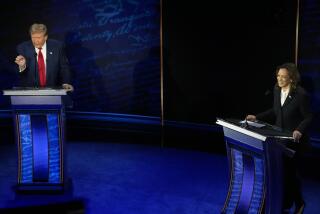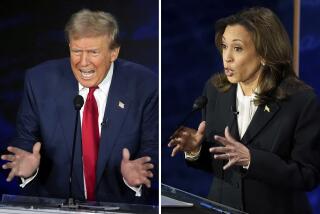Republican debaters aim answers at next states
- Share via
MYRTLE BEACH, S.C. — In a debate flecked with appeals to voters in upcoming primary states, Republican presidential candidates clashed Thursday over their suitability for the presidency and which of them could best carry forward the mantle of Ronald Reagan.
Barely two minutes passed from the start of the debate to the first contentious exchange, opened by former Massachusetts Gov. Mitt Romney. He took Arizona Sen. John McCain to task for telling Michigan voters Wednesday that some jobs that had left the economically pressed state would not be coming back.
“I disagree,” Romney said, adopting the sunny outlook associated with Reagan. “I’m going to fight for every single job. Michigan, South Carolina, every state in this country. We’re going to fight for jobs and make sure that our future is bright.”
McCain responded tersely, if somewhat less caustically than during their debate before the New Hampshire primary this week.
“One of the reasons why I won in New Hampshire is because I went there and told them the truth,” he told Romney. “And sometimes you have to tell people things they don’t want to hear along with things that they do want to hear. . . . Let’s have a little straight talk. There are some jobs that aren’t coming back to Michigan. There are some jobs that won’t come back here to South Carolina. But we’re going to take care of them.”
As Romney and McCain repeated the sparring that marked the New Hampshire primary, two other candidates vying for the votes of their fellow Southerners took each other on.
Former Sen. Fred Thompson of Tennessee, in one of his most forceful debate appearances, offered a harsh repudiation of former Arkansas Gov. Mike Huckabee, who with his victory in the Iowa caucuses last week captured the allegiance of the Christian conservatives on whom Thompson’s campaign also depends.
Taking off on a question about whether President Reagan’s electoral coalition still exists, Thompson said that the election was “a battle for the heart and soul of the Republican Party.”
“You have the Reagan coalition of limited government and strong national security,” he said. “On the other hand, you have the direction that Gov. Huckabee would take us in.”
He ticked off Huckabee’s “liberal” economic and foreign policies, cited his past support for allowing the children of illegal immigrants to attend public schools, and accused him of opposing state’s rights. The latter are loaded words in the South, where some elements still rankle at what they consider federal intrusion during the civil rights era.
“That’s not the model of the Reagan coalition,” Thompson said. “That’s the model of the Democratic Party.”
Huckabee first deflected the criticism with a joke he attributed to the Air Force: “If you’re not catching flak, you’re not over the target. I’m catching the flak. I must be over the target.”
He then defended his record, insisting that he had cut taxes 94 times, which he said had led to “people protesting me and screaming and yelling and doing demonstrations.”
“But I stayed faithful to the things that Ronald Reagan stayed faithful to,” he said, noting that Reagan also had raised taxes.
The debate, sponsored by the South Carolina Republican Party and Fox News, came two days after McCain’s broad victory in New Hampshire. The race is now moving on very different geographic tracks. On Tuesday, voters in Michigan go to the polls; four days later, on Jan. 19, South Carolina Republicans will cast their ballots. Florida votes Jan. 29, and a host of states, including California, vote Feb. 5.
There was an undeniable Southern cast to the debate, with Romney’s reference to a past visit to the Lizard’s Thicket restaurant in South Carolina and Huckabee’s citation of praise for him in a truckers magazine. But with the proximity of the Michigan contest, references to that state abounded as well.
The disagreements over who best replicated Reagan also had a connection to Michigan. The coalition that elected him twice depended on crossover votes from Democrats in the Upper Midwest. Huckabee appeared to be courting those voters particularly.
“A lot of people are working harder this year than they worked a year ago, and yet they’re not getting ahead,” he said, reprising his economic populist argument from Iowa. “Even if they make more money, they’re not making enough money to make up.”
Former New York Mayor Rudolph W. Giuliani appeared to be aiming at voters in Florida, where he has staked his campaign’s future. He mentioned his opposition as mayor to allowing Cuban President Fidel Castro -- the bane of many Florida voters -- to attend a United Nations event. He also defended the state of Israel, noting his close friendships with many of its leaders. And he insisted that he had supported President Bush’s decision to send more troops into Iraq.
That came after McCain said that he alone among the Republican candidates had argued for the decision.
“I’m the only one on this stage that did,” McCain said.
Giuliani responded deferentially, but firmly. “John gets great credit for supporting the surge,” he said. “But, John, there were other people on this stage that also supported the surge.”
McCain said his criticism of the Bush administration’s strategy had led to the buildup, while other candidates, including Giuliani, had supported it after the fact: “That’s the difference.”
As he has during many of the debates, Rep. Ron Paul of Texas served as something of a comic foil, although at least once it came at his expense. Questioner Carl Cameron prefaced a question to him with a lancing comment: “Congressman Paul, yet another question about electability. Do you have any, sir?”
Paul argued that he has hewed more closely to core Republican principles on spending, foreign policy and civil liberties than any of the other candidates.
“You’re suggesting that I’m not electable and the Republicans don’t want me because I’m a strict fiscal conservative, because I believe in civil liberties?” Paul responded.
Decker reported from Los Angeles; Reston from Myrtle Beach.
More to Read
Sign up for Essential California
The most important California stories and recommendations in your inbox every morning.
You may occasionally receive promotional content from the Los Angeles Times.












